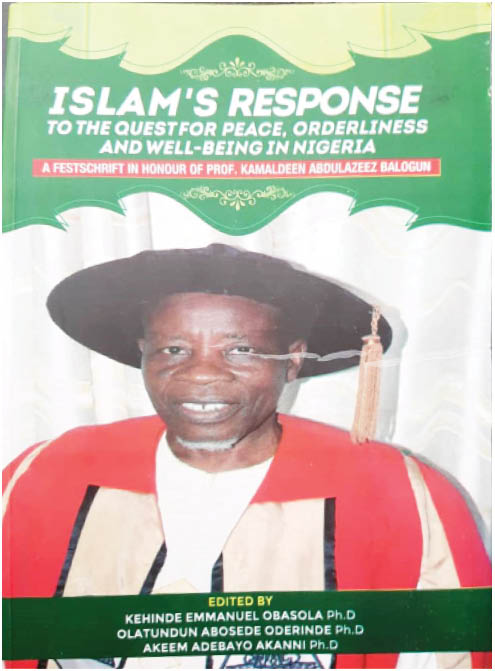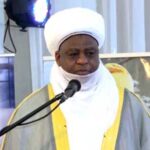Title: Islam’s Response to the Quest for Peace, Orderliness and Well-Being in Nigeria – A Festschrift
Editors: Kehinde E. Obasola, Olatundun A. Oderinde and Akeem A. Akanni
Reviewer: Saheed Ahmad Rufai
This book comprises authors from diverse academic backgrounds. Its six sections contain thirty-four chapters contributed by forty-five prolific scholars from twenty institutions of higher learning covering all but two of the six-geopolitical zones of Nigeria. It is remarkable that only fourteen of these forty-five contributors are affiliated with Olabisi Onabanjo University, where the subject of the festschrift is based.
In its first paragraph, the foreword, written by the Vice-Chancellor of the university, Professor Ganiyu Olatunji Olatunde, leaves no one in doubt over the worthy nature of the work. In Section One which comprises five chapters, Chapters 1, 2, 3 and 5 shall be reviewed in reverse order in the conclusion owing to their peculiarities. Afolorunso Dairo and Fornatus Alabi, in Chapter 4, see peace building as ‘usually an aftermath of conflict…which takes critical and tactical analysis of issues by those who, because of their positions in the society, are respected by the populace’ (p. 47). The authors engage with the hazards of leadership in peace building (p. 56) but fail to distinguish between the roles of key stakeholders identified in the chapter who, in most cases, lack the expertise required for the ‘critical and tactical analysis of issues’ (p.47) assigned to them which, in the scholarship of Security Studies, is the job of technical stakeholders who are security experts.
- Landmine kills 5 soldiers, injures 15 others in Borno
- How strike, COVID-19 wrecked education calendar
Section Five is the most diverse and covers sufism, literature, history and civilization, and religion. In Chapter 27, Dauda Yusuf makes a case for sufism in the realization of ethical and spiritual values in Nigeria and examines various sufi concepts (pp. 400-404). In Chapter 28, Rafiu Surakat examines the concept and typology of feminism (pp. 410-415). What is conspicuously missing in this excellent chapter is what makes al-Kansa a feminist poet. The author identifies her courage and perseverance as instrumental to her attainment of eminence but fails to demonstrate that any of these qualifies her as a feminist poet. It is a good chapter though the Arabic version of the quoted Al-Khansa’s poem was inaccurately captured (pp. 416-417) and the very verse that launched al-Khansa into prominence is missing: ‘Sunrise reminds me of Sakhr’!
In Chapter 29, Aminu Taofiki and Ayinla Akanni identify the historical sites in the Sokoto Caliphate which include Maratta, where Shehu Usmanu Danfodiyo was born, Degel, where Abdullah Danfodiyo was born, Gudu to which the Shehu migrated. But for its omission of the present Sultan’s Palace in Kawunri, this chapter would probably have passed for an exhaustive list of historical sites in Sokoto. Lawrence Abiola, in Chapter 30, identifies visits to Makkah and Madina by many Nupe indigenes as a positive impact of Islam on them and reduction in the number of the traditional religious festivals as a negative impact whereas AbdulGaniy Hashimi’s chapter, the thirty-first, sees the spread of Islam from its earliest days as the beginning of both the theological and cultural crisis between the people of the West and East (p. 465).
Section Six comprises three chapters. In the first, Chapter 32, Olalekan Arikewuyo examines the development of Islamic universities in Nigeria. Obviously the shortest in the section, the chapter identifies three categories of private universities in Nigeria and also identifies Al-Hikmah, Al-Qalam, Crescent, Fountain, and Summit as ‘Islamic universities’ (pp. 483-484). How accurate is it to characterize all these universities as ‘Islamic’? Are they truly ‘Islamic’ or merely ‘Muslim’ universities? Are there no distinctions between a ‘Muslim’ university and an ‘Islamic’ university? These are some of the salient questions that should have guided this interesting chapter.
Chapter 33, by Rasheed Adeleke examines the evolution of Islamic Education in Nigeria while Chapter 34, by Sulaiman Adua which is highly commendable, erroneously employs the terms Islamic Studies and Islamic Education interchangeably whereas Islamic Studies is a body of knowledge constituting the discipline while Islamic Education is all-encompassing as it applies to the totality of learning activities involved in schooling.
In Chapter 1, Samuwilu Owoyemi similarly examines the Professor’s strategies in building symbiotic relationship between the town and the gown, and his enviable record as an academic leader and university administrator. Aside the author’s imprecise translation of Rihlaul-Bahth as ‘Drama in Arabic’ instead of ‘Voyage of Research’ and inaccurate translation of Arba’un Qissah as ‘Short Stories in Arabic’ instead of ‘Forty Stories’, the chapter would probably have been a perfect piece.
May I congratulate all those involved in this Festschrift especially the editors for providing us a unique book whose title does not promise more than it can hold as is often experienced in academic publishing. I shall not comment on typos and minor linguistic errors which are not numerically sufficient to mar the quality of the sophisticated book, as such errors and related queries will receive appropriate attention before another edition of the book is out. But for the editors’ erroneous claim on the back cover that the book contains thirty-three papers, whereas it contains thirty-four, the cover page would have been its strongest selling point. Even the Vice-Chancellor confirms in his Foreword (page iv) that the papers are thirty-four!
The picture on the front cover was carefully selected to say, ‘here is a towering academic figure whose immense learning, exemplary character, and uncommon religiosity are probably best described as conjoined triplets of human excellence’. The book is invaluable for those within and outside the field of Religious Studies, and I hereby say, as the Vice-Chancellor says in his Foreword, ‘I recommend the book to all and sundry, from policy makers to individuals, as there are useful excerpts for everyone in the Festschrift’.
Saheed Ahmad Rufai is the immediate past dean, Faculty of Education, Sokoto State University.

 Join Daily Trust WhatsApp Community For Quick Access To News and Happenings Around You.
Join Daily Trust WhatsApp Community For Quick Access To News and Happenings Around You.


